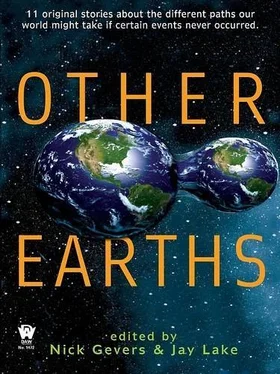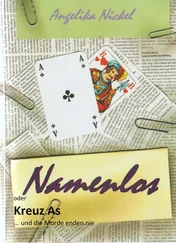Because there was no wind that day, the gas alert remained high until the middle of the evening. When it was safe, I went out with two masks and a torch, back to the hut, just in case there was still a chance for Ralph. But when I got to the hut, the door was open and the room empty. Everything was neat and tidy—the box back on the shelf, the headphones back on their hook, the chair set back under the desk.
We didn’t find him until morning.
He was sitting in one of the seats attached to the steerable locator we had driven past on our way in. He must have known what to do because he had the headphones on, and one of his hands was still on the wheel that adjusted the angle of the receiver. The other chair was empty. The flattened disk was aimed out to sea, out to France, a few degrees above the horizon.
The thing was, they never did tell me what killed him—whether it was the gas, or being out all night in the cold, or whether he just grew tired and decided that was enough war for one lifetime. But what I do know is what I saw on his face when I found him. His eyes were closed, and there was nothing in his expression that said he’d been in pain when the end came.
Now, I know people’ll tell you that faces relax when people die, that everyone ends up looking calm and peaceful, and as an ambulance man I won’t deny it. But this was something different. This was the face of a man listening to something very far away, something he had to really concentrate on, and not minding what he heard.
It was only later that we found the thing he had in his hand, the little piece of pink paper folded like an envelope.
Four days later I was able to visit George. He was in bed in one of the wards at Cranbrook. There were about five other men in the ward, most of them awake. George was looking better than when I’d last seen him, all messy and bandaged. He still had bandages on his head and arm, but they were much cleaner and neater now. His hair was combed, and his moustache had been trimmed.
“I’m glad you’re still here, sir,” I said. “I was frightened you’d be transferred back to Dungeness before I could get to see you. I’m afraid we’ve been a bit stretched the last few days.” I had to raise my voice because Mr. Chamberlain was on the wireless in the corner of the ward doing one of his encouraging “one last push” speeches.
“Pull the screens,” George said.
I did as I was told and sat down on the little stool next to his bed. The screens muffled some of Mr. Chamberlain’s speech, but every now and then his voice seemed to push through the green curtains as if he were trying to reach me personally, the way a teacher might raise his voice to rouse a daydreaming boy at the back of the class.
“You’re looking better, sir,” I offered.
“Nothing time won’t heal.” He touched the side of his head with his good arm, the one that wasn’t bandaged. “I’ll be up on my feet in a week or two, then I’ll get my new posting. No use for me in Dungeness anymore, though—my hearing’s no longer tip-top.”
“Won’t it get better?”
“Perhaps, but that won’t make much difference in the long run. They’re getting rid of the sound mirrors. We always knew it was coming, but we thought we’d be good for another year. It turns out that the new system won’t need men listening on headphones. The new breed will stare at little screens, watching dots move around.”
Mr. Chamberlain said something about “over by Christmas,” followed by “looking forward to a bright and prosperous Nineteen Thirty-Six.”
“And the music, sir?” I asked.
“There won’t be any more music. Wherever it came from, whatever it was that let us hear it …it’s gone now, or it will be gone by the time they tear down the mirrors. Even if it’s still coming through to Dungeness, there won’t be anyone there who can hear it. Best to forget about it now, Wally. I’ve no intention of speaking about it again, and with Ralph gone, that only leaves you. If you’ve an ounce of common sense—and I think you’ve rather more than an ounce—you’ll say no more of this matter to any living soul.”
“I’m sorry about Mr. Vaughan Williams, sir.” I’d called him Ralph all the time I had known him, but sitting next to George I found myself coming over all formal. “He was always kind to me, sir, when we were doing our ambulance duties. Always treated me like an equal.”
“He was a good man, no doubt about that.” George said, nodding to himself. Then he patted the bedsheet. “Well, thank you for coming to visit, Wally. Knowing how busy you ambulance chaps are, I appreciate the gesture.”
“There’s another reason I came, sir. I mean, I wanted to see that you were all right. But I had something for you as well.” I reached into my pocket and withdrew the folded piece of pink paper. “We found this on him. It’s one of your transcriptions, I think.”
“Let me see.” George took the paper and opened it carefully. His eyes scanned the markings he had made on it, the scratchy lines of the staves and the little tadpole shapes of the notes. There were lots of blotches and crossings-out. “Did you see him do this?” he asked, looking at me over the edge of the paper.
“See him do what, sir?”
“He’s corrected me! You wouldn’t have noticed, but not all of those marks were made by me! The beggar must have sat down and taken the time to correct my transcription of my music!”
“When we were on our way to the shelter, sir?”
“Must have been, I suppose.” George shook his head in what I took to be a mixture of dismay and amusement. “The absolute bare-faced effrontery!” Then he laughed. “He’s right, though—that’s the galling thing. He’s bloody well right!”
“I thought you ought to have it, sir.”
He began to fold the paper away. “That’s very kind of you, Wally. It means a lot to me.”
“There is something else, sir. When we found that sheet of paper on him, he’d folded something into it.” I reached into my pocket again and drew out a small brass key. “I don’t know what to make of this, sir. But I’ve a personal effects locker, and my key looks very similar. I think this might be the one to his locker.” I felt as if I were about to start stammering. “The thing is, there is a locker, and no one’s managed to get into it yet.”
I passed the key to George.
“Why would he put his key in that piece of paper? Anything personal, he’d have wanted it sent on to Adeline.”
“He must have known what he was doing, sir. You being a composer and all that …I just wondered …” I swallowed hard. “Sir, if there was music in that locker, he’d want you to see it first, wouldn’t he?”
“What makes you think there might be music, Wally?”
“When you asked him if he’d written any of it down, he said he hadn’t.”
“But you wonder if he was telling a fib.”
“It’s a possibility, sir.”
“It is indeed.” George’s hand closed slowly on the key. “I wonder if him correcting my music was a sign, you know? A way of giving me permission to correct his if I saw something in it I didn’t think was right? Or at the very least giving me permission to tidy it up, to put it into some kind of order?”
“I don’t know, sir. I suppose the only way of knowing would be to open the locker and see what’s in it.”
“And you haven’t already done so?”
“I thought that would be a bit impertinent, sir, as he’d clearly meant for you to open it.”
George passed the key back to me. “I can’t wait. Go and see what’s inside now, will you? I assume they’ll let you?”
“I was his ambulance mate, sir. They’ll let me anywhere.”
Читать дальше












